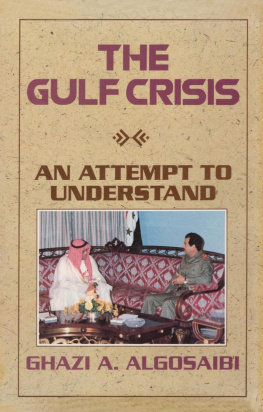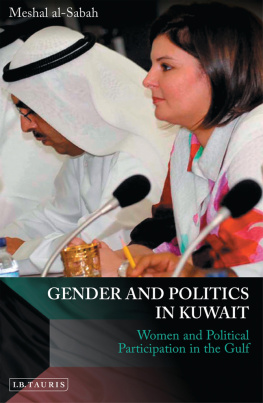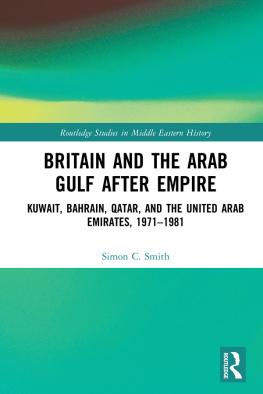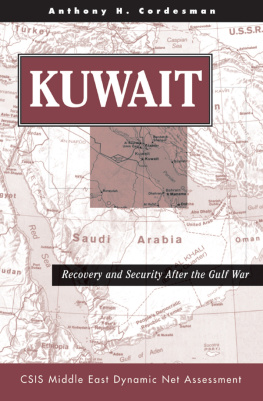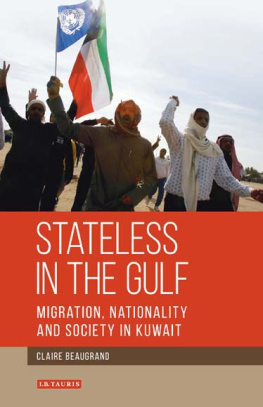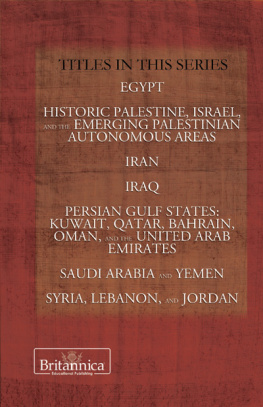ROUTLEDGE LIBRARY EDITIONS: SOCIETY OF THE MIDDLE EAST
Volume 10
KUWAIT AND THE GULF
KUWAIT AND THE GULF
Small States and the International System
HASSAN ALI AL-EBRAHEEM
First published in 1984 by Croom Helm Ltd
This edition first published in 2016
by Routledge
2 Park Square, Milton Park, Abingdon, Oxon OX14 4RN
and by Routledge
711 Third Avenue, New York, NY 10017
Routledge is an imprint of the Taylor & Francis Group, an informa business
1984 Hassan Ali Al-Ebraheem
All rights reserved. No part of this book may be reprinted or reproduced or utilised in any form or by any electronic, mechanical, or other means, now known or hereafter invented, including photocopying and recording, or in any information storage or retrieval system, without permission in writing from the publishers.
Trademark notice: Product or corporate names may be trademarks or registered trademarks, and are used only for identification and explanation without intent to infringe.
British Library Cataloguing in Publication Data
A catalogue record for this book is available from the British Library
ISBN: 978-1-138-19040-5 (Set)
ISBN: 978-1-315-62817-2 (Set) (ebk)
ISBN: 978-1-138-19449-6 (Volume 10) (hbk)
ISBN: 978-1-315-62957-5 (Volume 10) (ebk)
Publishers Note
The publisher has gone to great lengths to ensure the quality of this reprint but points out that some imperfections in the original copies may be apparent.
Disclaimer
The publisher has made every effort to trace copyright holders and would welcome correspondence from those they have been unable to trace.
KUWAIT AND THE GULF
Small States and the International System
Hassan Ali Al-Ebraheem
1984 Hassan Ali Al-Ebraheem
Croom Helm Ltd, Provident House, Burrell Row,
Beckenham, Kent BR3 1AT
Croom Helm Australia, PO Box 391,
Manuka, ACT 2603, Australia
British Library Cataloguing in Publication Data
Al-Ebraheem, Hassan Ali
Kuwait and the Gulf.
1. States, Small 2. International relations
3. Persian Gulf RegionForeign relations
I. Title
327.09536 DS326
ISBN 0-7099-0527-0
1984 Hassan Ali Al-Ebraheem
All rights reserved. For information write:
Center for Contemporary Arab Studies, Georgetown University,
Washington, D C 20057
First published in the United States of America 1984
Library of Congress Catalog Card Number 83-72166
ISBN 0-932568-08-4
Printed and bound in Great Britain
CONTENTS
I am deeply indebted to the Center for Contemporary Arab Studies of Georgetown University, Washington, DC, where I enjoyed every courtesy as a Visiting Scholar. Dr Peter F. Krogh, Dean of the Universitys School of Foreign Service, Dr Michael C. Hudson, the Centers director, and Dr Hisham Sharabi were always supportive of my efforts. The Kuwait University Office in Washington, DC made my stay in Washington a pleasant one. Dr Saif Abdulla, Director of the Kuwait University Office, and Dr Richard Stevens, Assistant Director, extended their official and personal assistance. J. Coleman Kitchen, Jr, the Centers copyeditor, provided a carefully and thoughtfully edited manuscript for final publication. Huda Ajlouni and Mercedes Infante prepared early drafts of the manuscript with great patience and care, and Jeane Tarabulsi assisted with the editing and typing. Dr Sharabi, Dr Stevens, and Dr George Abed read and commented upon the manuscript. I am also grateful to the Library of Congress, which provided research assistance and facilities.
Hassan Ali Al-Ebraheem
Kuwait
One of the major events of the twentieth century has been the emergence of numerous newly independent small states. Many of these new states have found that it is easier to win independence than to achieve national integration, and are beset by administrative and resource problems. Often, their history since independence has been characterized by civil wars, political instability, and economic stagnation. In their efforts to combat economic ills, the leaders of these countries have generally been forced to swing from socialist economics to free enterprise and capitalistic policies. In many cases, hasty and sometimes ruinous economic decisions have led to massive indebtedness, which in turn has resulted in even more distorted policies. In Egypt and other Third World societies caught in the debt trap (Peru, Zaire, Turkey, to name a few), the result will be to sacrifice their economic autonomy. In country after country, the politics of credit worthiness has more to say about the actual conduct of policy than any ideological exhortations. The crisis of foreign debt brings in its train new forms of intervention and dependence.1
This book is about small states in general, but it focuses on the Gulf region, where a number of small states share a very narrow body of water. This volatile area was ruled for many years by a colonial power which was able, through the use of force, to impose peace until it withdrew. Endowed with precious natural resources, the region now finds itself rent by internal territorial and ideological conflicts and threatened by superpower competition. This study will assess the prospects of the states of this region.
presents some conclusions about the role and prospects of small states and in particular the Gulf countries.
Note
1. F. Ajami, Retreat from Economic Nationalism: The Political Economy of Sadats Egypt, Journal of Arab Affairs, Vol. 1, No. 1 (Oct. 1981), p. 44.
Family of nations, world community, international society these are all familiar terms. The concept of the world as an international system, however, is a relatively new one only recently introduced into the field of international politics; this idea reflects the significant changes that have taken place in the international arena since the end of World War II as well as the desire of scholars to utilize a more scientific method involving more precise and quantitative measurements. This chapter will describe the major features of the current international system, characterized as it is by imperialism, the growing number of new states, efforts toward political and economic integration, polarization, proxy war, growing economic inequalities between the have and have-not states, and power diffusion within the traditional blocs. Through an examination of these trends we may better understand how a small state such as Kuwait interacts with the changing international system.
Imperialism
Imperialism cultural, economic, political and militaristic has been a part of the international system for a long time. Although there have been many attempts to justify imperialism in the past, the smaller states consider it the cause of many of the worlds tragedies, including much of their own economic and political predicament today. The rationale for empire building used by the United States is particularly illustrative, since, as William Appleman Williams notes, it was predicated





